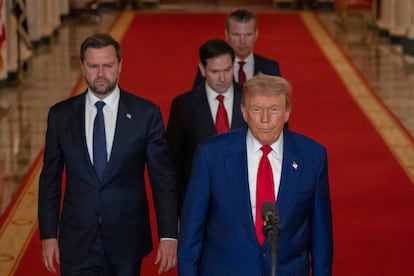What Trump’s reckless attack on Iran means for the world
This analysis explores potential targets of Iranian retaliation, the prospects for regime collapse, and the broader implications for nuclear non-proliferation in the aftermath of the bombing

The world is galloping toward a dark abyss, spurred on by shadowy leaders who don’t hesitate to resort to force to assert their interests. The geopolitical atlas already included an unrestrained Putin and Netanyahu; now, those who believed in Trump’s promises that the “America First” president would aim to end wars rather than start them have no choice but to add Trump to the list of leaders who ruthlessly project power through violence. The U.S. attack paves the way for far-reaching risks.
Trump’s hope is that an Iran regime, weakened by a clear demonstration of military inferiority — already evident in the 2024 clashes with Israel — will opt for the unconditional surrender sought by the White House, thus settling the matter. This scenario is highly unlikely.
Iran is more likely to seek retaliation.
It could attempt this with conventional attacks against the many U.S. bases in the region that are within reach of its missiles, only some of which have air defense systems. The U.S. has various deployments in Bahrain, Kuwait, Qatar, the United Arab Emirates, Egypt, Iraq, Jordan, Oman, Saudi Arabia, and Syria. And of course, naval military targets deployed in the area could also be attacked.
Iran could also opt for a hybrid retaliation. It could strike diplomatic facilities — Israel bombed an Iranian consulate in Syria. It could activate terrorist options, or conduct cyberattacks using operational capabilities it has patiently built up over time after suffering the humiliating blow of the Stuxnet virus, launched by Israel and the U.S., which slowed its nuclear program at the start of the last decade. And it could even attack shipping vessels in the Persian Gulf and the Strait of Hormuz, which would have strong repercussions in global hydrocarbon markets. It is worth recalling the deep consequences of the inflationary spiral linked to the war in Ukraine. That inflation helped Trump win the election to a large extent. Food and energy prices were the foundation of a political and geopolitical earthquake.
Iran’s retaliation will likely not be very effective, given the enormous asymmetry of resources, as shown by Israel’s total control of the airspace and the inaccuracy of Iranian operations. But even if ineffective, Iran’s reaction would provoke a U.S. response. This spiral need not be endless. Iran could choose a limited retaliation that allows it to say it has not surrendered, prompting a limited U.S. response and paving the way for gradual de-escalation. History shows that other cycles of violence have, at times, been halted. That is Trump’s hope. But the specter of an uncontrolled spiral is serious enough that all previous presidents before Trump avoided the action that the New York magnate launched tonight. The risk he has taken on is enormous.
In this context, some evoke the specter of the Iraq disaster. The Iraq war was different in that it involved a ground invasion, which is not currently on the table. But it can still serve as a precedent in other ways: prolonged conflict, and the terrible chaos that would follow if the regime were to fall.
The latter is undoubtedly Netanyahu’s objective, and probably Trump’s as well. Iran’s government is an authoritarian and shadowy regime that secretly developed parts of its nuclear program — as verified by International Atomic Energy Agency inspectors — and unacceptably represses its population, especially women. It’s likely that a broad majority of Iranians despise the regime. But it is by no means certain it will fall — external attacks usually provoke a rally-around-the-flag effect, unless the regime is fully decapitated and dismantled. And in any case, assuming its fall would lead to something better — not even a clean democratic government, but simply something a bit better — is probably a naïve dream.
Much more likely in the event of a regime collapse is a turbulent transition, possibly very violent, given the characteristics of the country and the region. There is no doubt that a violent, possibly fragmented Iran is a dream scenario for Netanyahu. An editorial in the Israeli newspaper Jerusalem Post openly called on Trump to join the plan to fragment Iran. It might also be a dream for several of its Sunni adversaries. But Netanyahu’s dream — and others’ — would be a tragedy for 90 million Iranian citizens and certainly for the region and the world. A refugee wave scenario cannot be ruled out. The Syrian refugee crisis in 2015 was a defining moment in the rise of far-right forces in several European countries.
But there are further consequences for the world. Iran will likely withdraw from the Treaty on the Non-Proliferation of Nuclear Weapons. If the regime resists, it will take time, but it will most likely pursue the nuclear bomb. And regimes around the world are watching the events: Ukraine — which gave up its inherited Soviet nuclear arsenal in the 1990s in exchange for a promise, through the Budapest Memorandum, not to be attacked — was mercilessly attacked two decades later. Iran has now been attacked. North Korea — which secretly built its bomb — has not been attacked. The incentive to acquire nuclear weapons is at its peak.
The erosion of the multilateral order and the security treaty architecture is also significant. Netanyahu — who has the nuclear bomb — spews pompous words about denying a despicable regime the path to an atomic weapon. But the most likely ultimate result of his action — and that of his partner, Trump — is further nuclear proliferation.
And that’s not all. Trump’s decision is of highly dubious legality. The U.S. constitutional architecture requires congressional authorization to launch a war. The Trump administration maintains that the action against Iran is limited and does not require such authorization. But, given its nature — it is not a response to an attack, it is not a targeted strike — it closely resembles a constitutional violation. A dangerous precedent of violence unleashed without democratic oversight by the world’s leading military power. Another dark consequence for the world of a terrible attack at the start of summer.
Sign up for our weekly newsletter to get more English-language news coverage from EL PAÍS USA Edition
Tu suscripción se está usando en otro dispositivo
¿Quieres añadir otro usuario a tu suscripción?
Si continúas leyendo en este dispositivo, no se podrá leer en el otro.
FlechaTu suscripción se está usando en otro dispositivo y solo puedes acceder a EL PAÍS desde un dispositivo a la vez.
Si quieres compartir tu cuenta, cambia tu suscripción a la modalidad Premium, así podrás añadir otro usuario. Cada uno accederá con su propia cuenta de email, lo que os permitirá personalizar vuestra experiencia en EL PAÍS.
¿Tienes una suscripción de empresa? Accede aquí para contratar más cuentas.
En el caso de no saber quién está usando tu cuenta, te recomendamos cambiar tu contraseña aquí.
Si decides continuar compartiendo tu cuenta, este mensaje se mostrará en tu dispositivo y en el de la otra persona que está usando tu cuenta de forma indefinida, afectando a tu experiencia de lectura. Puedes consultar aquí los términos y condiciones de la suscripción digital.









































